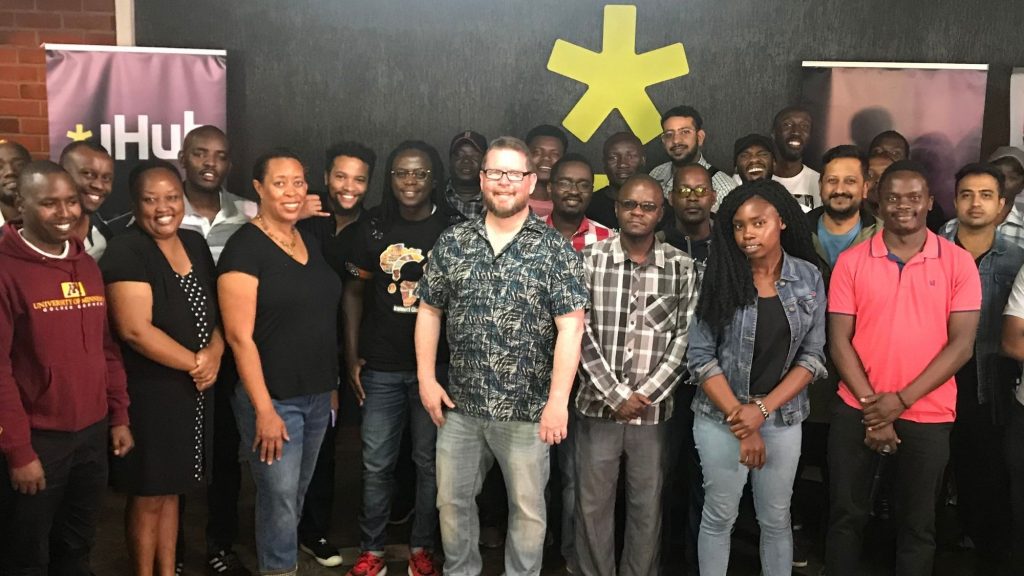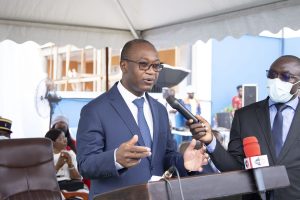Four young scientists, accompanied by Eskom Expo’s Business Manager, Mmamoloko Rancia Riba, won their place to represent the country at the Indonesia competition, renowned…
Innovative 5G Mokki Tech Spaces to be built across Africa

High-tech learning and communication environments, known as 5G Mokki Tech Spaces, will soon be built across Africa. This, after a partnership between role players in Cameroon, Kenya and Finland.
The 5G Mokki Tech Spaces will be in the shape of small cottages, explains Boris Ngala, the founder and chief executive of the Boris Bison Youth Empowerment Business Incubator (“BB Incubator”).
Ngala founded the BB Incubator after returning to Cameroon, his home country, following seven years abroad. He was determined to reduce poverty through technology-driven solutions, entrepreneurial training and business advice.
Today, the BB Incubator is the first of its kind in Africa to adopt the 5G Mokki Tech Spaces. It is a result of a newly-formed partnership with Ludique Works, a Kenyan video game publisher, and Start North in Finland.
Ngala says, “Our aim is a Pan-African tech space network that connects the African continent to Europe and the rest of the world, promoting the learning and adoption of technology, remote work, and entrepreneurship.
“In addition to promoting education, jobs, and the economic development of the regions, the network also aims to curb climate change by utilising the latest technology.”
The announcement comes just weeks after BB Incubator’s opening ceremony in Douala, where Cameroon’s minister for small and medium-sized enterprises, social economy and handicrafts, Bassilekin III Achille, pledged his support to Ngala.
The BB Incubator provides office facilities, computer equipment services, internet connectivity, entrepreneurial training and business advisory services to promising local start-up companies and young entrepreneurs.
5G technology
Ngala explains that the “mokki” in 5G Mokki Tech Spaces is derived from the Finnish word “mökki”, meaning “cottage”. The cottage enables innovative uses of fifth-generation (5G) mobile communication technology.

In the case of the incubator and its start-ups, it can be used, among other things, to develop software applications that require ultra-fast internet connections, to render immersive, three-dimensional, virtual-reality and augmented-reality learning experiences, as well as to deliver innovation services and remote work to corporations around the globe.
Compared to the technology standards preceding it, fifth-generation wireless communication technology will enable data connections that are a hundred times faster on mobile devices and ten times faster than the fastest fixed broadband services currently.
Its true potential lies in enabling entirely new categories of applications, believes Ngala. Think remote control of drones, self-driving cars and complex industrial processes. Think remote surgery. Think remote work and meetings in virtual or augmented reality. Think remote learning.
The operative word is “remote”, believes Douglas Ogeto, co-founder and CEO of Ludique Works. He is also one of the co-Founders of the 5G Mokki Tech Space network.
Ludique Works is deploying the cottages in Kenya and South Africa and is committed to building a network of 5G Mokki Tech Spaces in other African countries as well.
Ogeto says, “The 5G Mokki Tech Space network has the ability to serve international and local companies, to provide creative-economy and technology based jobs and promote entrepreneurship based on the learning of the latest technology and hands-on projects that serve local conditions.
“Furthermore, this is supported by extensive national and international collaboration with universities and companies.”
Powerhouse potential
With its natural resources, young population and growing markets, Africa has the potential to become a productivity powerhouse. Given Europe’s and Africa’s overlapping time zones, European corporations could find access to technologically skilled labour and services from Africa via high-touch, 5G-enabled remote connections in real time.
The 5G Mokki Tech Spaces aim to hit several birds with one stone: to provide the technology that enables advanced learning environments with remote connectivity, as well as to offer learning solution content, starting in the fields of technology and entrepreneurship.
The spaces are being developed by Start North, a Finnish accelerator network that aims to promote the learning and application of new technologies to meet the challenges of global sustainable development. The concept was pioneered by leading Finnish universities.
As part of a collaboration programme between Start North and Ludique Works in Africa, over 250 young people from across the continent applied for the 5G Summer School. More than 60 participants successfully completed the programme with a number of them earning ECTS (European Credit Transfer and Accumulation System) credits.
Aalto is in talks with several business schools and universities in Africa, including the African School of Economics with campuses in Nigeria, Ivory Coast and Benin, and Addis Ababa University in Ethiopia. Furthermore, a project is underway to set up a 5G Mokki in a rural area in Zambia, powered by solar energy, to provide immersive learning and research in the field of agriculture.
Tapping into Africa’s talent
At the launch event of the 5G Mökki network at Häme University in Finland, in October 2021, Dr Mark Nelson, founder and director of innovation at the Stanford Peace Innovation Lab, drew parallels between the high-tech cottage, the invention of the microscope in biology and the telescope in space research, allowing the exploration of social interaction and society without people having to travel from one place to another.
Without innovative approaches to training and job creation, traditional degree-based education falls short of creating sufficient employment opportunities. To illustrate this point, approximately half a million students graduate from Cameroon’s universities every year, but only some 3 000 of these graduates tend to find employment.
The expansion of the 5G Mokki Tech Spaces network in Africa is in part facilitated by financial instruments developed jointly by the African Union and the European Union, aimed at improving connectivity, know-how, and sustainable social and economic development.
ALSO READ: Black founders can now apply for $4m Google funding

